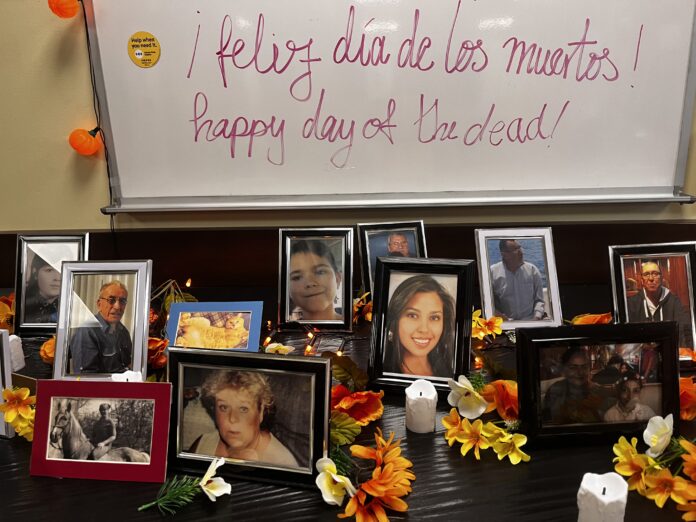
On Nov. 1, the St. Thomas University International Student Association (STUISA) and the STU Anthropology Society partnered to offer students the opportunity to participate in the Mexican holiday, The Day of the Dead, by building an altar and screening the award-winning movie, Coco.
Rigel Testas, the president of STUISA and Eugenia Flores, the president of the STU Anthropology Society, are both international students from Mexico and share the importance of the holiday.
“I just feel like it’s a nice thing to do so that people can know that our holiday exists because Canadians celebrate Halloween the day before,” said Flores. “We can share a little bit of our culture with them.”
The Day of the Dead is a multi-day Mexican holiday, traditionally celebrated from Nov. 1 to Nov. 2. The holiday consists of families and friends gathering to pay their respects and remember their deceased loved ones.
Testas said it is worth giving this opportunity to people to learn a different way of honouring the memory of those who have passed away.
This event allows Latin American students to have a piece of home even though it might spark up the nostalgia of being with their families.
“At least for one night, I see the colours and feel like I have some music that we would normally hear back home,” said Testas.
Flores later explained how the festivity is unique because they embrace the concept of death.
“In other countries, I feel like death is this taboo thing that we don’t talk about,” she said. “In Mexico, we actually don’t see it as the end. We welcome death as a friend. We know that it’s part of life.”
Flores and Testas said that the Day of the Dead is based on the belief that if you commemorate your loved ones, you can open a pathway between worlds and feel closer to them one more time.
“We grew up with the sense that there’s no last goodbye,” said Testas.
Even though Coco is not completely accurate, Testas and Flores said that it is a moving representation of their culture since the movie maintained the essence of the festivity such as music, physical appearances and food.
Meaghan O’Neill, the residence coordinator of Vanier Hall, also encouraged the residence community to join and open their minds to this celebration.
The residence team helped build the altar inside Vanier Hall, which residents contributed to by printing the pictures of those they had lost.
“I think it’s a very beautiful tradition,” she said.
As a Canadian, O’Neill shared that she had never experienced the deep homesickness international students go through, but she is in awe of how the cultural festivity brings everyone together.
“I love that aspect of community and family and sharing stories about loved ones,” she said. “It’s just important to make everyone feel welcome.”
